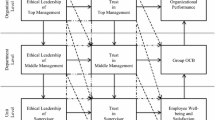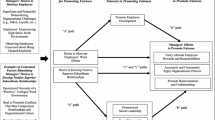Abstract
Of recent time, there has been a concern about ethical leadership and ethics in business. Research on leadership did not pay a lot of attention to fairness and many authors have studied the relationship between leader fairness and factors such as outcome satisfaction and trust in leader for instance. For the moment, there is no study that focused on the direct relationship between transformational leadership and fairness. That’s why; in this paper our aim is to study the relationship between transformational leadership and the employees’ perceptions of fairness, mainly the three types of fairness which are distributive, procedural, and interactional in French firms. A questionnaire survey was sent to employees working in the industry and service sectors. A sample of 100 respondents was collected. We found a partial relationship between employees’ perceptions of fairness and transformational leadership. More specifically, we found that procedural and interactional fairness are strongly associated with transformational leadership.
Similar content being viewed by others
References
Adams, J. S. (1965). Inequity in social exchange. In L. Berkowitz (Ed.), Advances in experimental social psychology (Vol. 2, pp. 267–299). New York: Academic Press.
Banerji, P., & Krishnan, V. R. (2000). Ethical preferences of transformational leaders: An empirical investigation. Leadership and Organization Development Journal, 21, 405–413.
Bass, B. M. (1985). Leadership and performance. New York: The Free Press.
Bass, B. M., & Avolio, B. J. (1994). Improving organizational effectiveness through transformational leadership. Thousand Oaks: Sage.
Bass, B. M., & Steidlmeier, P. (1999). Ethics, character, and authentic transformational leadership behavior. Leadership Quarterly, 10, 181–217.
Bies, R. J., & Moag, J. S. (1986). Interactional justice communication criteria of fairness. In R. Lewicki, B. H. Sheppard, & M. H. Bazerman (Eds.), Research on negotiation in organizations (Vol. 1, pp. 43–55). Greenwich, CT: JAI Press.
Burns, J. M. (1978). Leadership. New York: Harper and Raw.
Cohen, D. V. (1993). Creating and maintaining ethical work climates: Anomie in the workplace and implications for managing change. Business Ethics Quarterly, 3, 343–358.
Cohen-Charash, Y., & Spector, P. E. (2002). The role of justice in organizations: A meta-analysis. Organizational Behavior and Human Decision Processes, 86, 278–321.
Colquitt, J. A. (2001). On the dimensionality of organizational justice: A construct validation of a measure. Journal of Applied Psychology, 86, 386–400.
Colquitt, J. A., Conlon, D. E., Wesson, M. J., Porter, C. O., & Ng, K. Y. (2001). Justice at the millennium: A meta-analytic review of 25 years of organizational justice research. Journal of Applied Psychology, 86, 425–445.
Cropanzano, R., & Greenberg, J. (1997). Progress in organizational justice: Tunneling through the maze. In C. Cooper & I. Robertson (Eds.), International review of industrial and organizational psychology (pp. 317–372). New York: Wiley.
De Cremer, D., & Van Knippenberg, D. (2003). Cooperation with leaders in social dilemmas: On the effects of procedural fairness and outcome favorability in structural cooperation. Organizational Behavior and Human Decision Processes, 91, 1–11.
Den Hartog, D. N., & De Hoogh, A. H. B. (2009). Empowering behavior and leader fairness and integrity: Studying perceptions of ethical leader behavior from a levels of analysis perspective. European Journal of Work and Organizational Psychology, 18, 199–230.
Folger, R. (1987). Reformulating the preconditions of resentment: A referent cognitions model. In J. C. Masters & W. P. Smith (Eds.), Social comparison, justice, and relative deprivation: Theoretical, empirical and policy perspectives (pp. 183–215). Hillsdale, NJ: Lawrence Erlbaum Associates, Inc.
Folger, R., & Konovsky, M. A. (1989). Effects of procedural and distributive justice on reactions to pay raise decisions. Academy of Management Journal, 32, 115–130.
Greenberg, J. (1990). Employee theft as a reaction to underpayment inequity: The hidden costs of pay cuts. Journal of Applied Psychology, 75, 561–568.
Greenberg, J. (1993). The social side of fairness: Interpersonal and informational classes of organizational justice. In R. Cropanzano (Ed.), Justice in the workplace: Approaching fairness in human resource management (pp. 79–103). Hillsdale, NJ: Lawrence Erlbaum Associates, Inc.
Jeewon, C., & Fred, D. (2010). Are transformational leaders fair? A multi-level study of transformational leadership, justice perceptions and organizational citizenship behaviors. Leadership Quarterly, 21, 409–421.
Konovsky, M. A., & Pugh, S. D. (1994). Citizenship behavior and social exchange. Academy of Management Journal, 37, 656–669.
Leung, K., Su, S., & Morris, M. W. (2001a). When is criticism not constructive? The roles of fairness perceptions and dispositional attributions in employee acceptance of critical supervisory feedback. Human Relations, 54, 1155–1187.
Leung, K., Wang, Z., & Smith, P. B. (2001b). Job attitudes and organizational justice in joint venture hotels in China: The role of expatriate managers. International Journal of Human Resource Management, 12, 926–945.
Leventhal, G. S. (1980). What should be done with equity theory? New approaches to the fairness in social relationships. In K. Gergen, M. Greenberg, & R. Willis (Eds.), Social exchange theory (pp. 27–55). New York: Plenum.
Liao, H., & Rupp, D. E. (2005). The impact of justice climate and justice orientation on work outcomes: A cross-level multifoci framework. Journal of Applied Psychology, 90, 242–256.
Lipponen, J., Koivisto, S., & Olkkonen, M. E. (2005). Procedural justice and status judgments: The moderating role of leader in-group proto-typicality. Leadership Quarterly, 16, 517–528.
Moorman, R. H. (1991). Relationship between organizational justice and organizational citizenship behaviors: Do fairness perceptions influence employee citizenship? Journal of Applied Psychology, 76, 845–855.
Odom, L., & Green, M. T. (2003). Law and the ethics of transformational leadership. Leadership and Organization Development Journal, 24, 62–69.
Palanski, M. E., & Yammarino, F. J. (2009). Integrity and leadership: A multi-level conceptual framework. The Leadership Quarterly, 20, 405–420.
Parry, K. W., & Proctor-Thomson, S. B. (2002). Perceived integrity of transformational leaders in organizational settings. Journal of Business Ethics, 35, 75–96.
Pillai, R., Schriesheim, C. A., & Williams, E. S. (1999). Fairness perceptions and trust as mediators for transformational and transactional leadership: A two-sample study. Journal of Management, 25, 897–933.
Platow, M. J., Hoar, S., Reid, S., Harley, K., & Morrison, D. (1997). Endorsement of distributively fair and unfair leaders in interpersonal and intergroup situations. European Journal of Social Psychology, 27, 465–494.
Platow, M. J., Mills, D., & Morrison, D. (2000). The effects of social context, source fairness, and perceived self-source similarity on social influence: A self-categorization analysis. European Journal of Social Psychology, 30, 69–81.
Platow, M. J., Reid, S., & Andrew, S. (1998). Leadership endorsement: The role of distributive and procedural behavior in interpersonal and intergroup contexts. Group Processes and Intergroup Relations, 1, 35–47.
Ramaswami, S. N., & Singh, J. (2003). Antecedents and consequences of merit pay fairness for industrial salespeople. Journal of Marketing, 67, 46–66.
Sweeney, P. D., & McFarlin, D. B. (1993). Workers’ evaluations of the ‘‘ends’’ and the ‘‘means’’: An examination of four models of distributive and procedural justice. Organizational Behavior and Human Decision Processes, 55, 23–40.
Thibaut, J., & Walker, L. (1975). Procedural justice: A psychological analysis. Hillsdale, NJ: Lawrence Erlbaum Associates, Inc.
Tyler, T. R. (1994). Psychological models of the justice motive: Antecedents of distributive and procedural justice. Journal of Personality and Social Psychology, 67, 850–863.
Tyler, T. R., Boeckmann, R. J., Smith, H. J., & Huo, Y. J. (1997). Social justice in a diverse society. Boulder, CO: Westview Press.
Van Aswegen, A. S., & Engelbrecht, A. S. (2009). The relationship between transformational leadership, integrity and an ethical climate in organizations. SA Journal of Human Resource Management, 7, 1–9.
Van Knippenberg, D., & Hogg, M. A. (2003). A social identity model of leadership effectiveness in organizations. Research in Organizational Behavior, 25, 243–295.
Victor, B., & Cullen, J. B. (1988). The organizational bases of ethical work climates. Administrative Science Quarterly, 3, 101–125.
Wat, D., & Shaffer, M. A. (2005). Equity and relationship quality influences on organizational citizenship behaviors: The mediating role of trust in the supervisor and empowerment. Personnel Review, 34, 406–422.
Author information
Authors and Affiliations
Corresponding author
Rights and permissions
About this article
Cite this article
Bacha, E., Walker, S. The Relationship Between Transformational Leadership and Followers’ Perceptions of Fairness. J Bus Ethics 116, 667–680 (2013). https://doi.org/10.1007/s10551-012-1507-z
Received:
Accepted:
Published:
Issue Date:
DOI: https://doi.org/10.1007/s10551-012-1507-z




